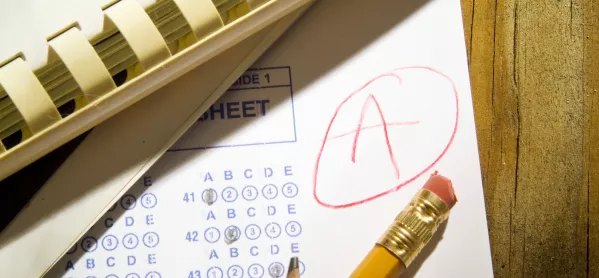
- Home
- Coronavirus: Grade system is fair, insists Swinney
Coronavirus: Grade system is fair, insists Swinney

Education secretary John Swinney has rejected claims that the system for awarding grades set out by Scotland’s exam body will disadvantage students in schools with lower rates of attainment.
Yesterday, the Scottish Qualifications Authority (SQA) published further information about how - in the wake of the decision to cancel this year’s exams because of coronavirus - students’ grades will be arrived at.
News: New statement on Scottish qualifications
Related: SQA issues new exam grade guidance
Coronavirus: Exams cancelled in Scotland
Opinion: ‘Use school closures to reset exam system’
At the core of the system will be teacher estimates of their students’ performance. However, the guidance put out yesterday said the SQA would moderate these estimates and could move them “up or down” based on a student’s prior attainment and also “schools’ and colleges’ previous history of estimating and attainment in each subject and level”.
This has prompted some - including the Scottish Greens’ education spokesman, Ross Greer - to express concerns that students in schools with lower pass rates could have their grades revised down.
In a statement, Scottish Labour education spokesman Iain Gray also said there were “questions about the appropriateness of using a school’s previous performance to overrule teacher judgement”, while teachers and education researchers have also expressed concern.
Coronavirus: Will grades be awarded fairly after exam cancellations?
Geography teacher Brian Donlin wrote a series of tweets summing up his reaction: “So we are still living in a world were the SQA are asking for teacher evidence, telling us that our professional judgement is valued, but saying they will change our estimates based on historical trends.
“So if you are a new teacher at a school, tough luck - you better hope your predecessor was good. If you have a group of talent[ed] young people in a less affluent area where results have been a struggle? Tough luck, they’re very likely to suffer.
“This is a farce and the only solution I can see is for every teacher across Scotland to appeal any alteration the SQA make to their estimates.”
On BBC Radio Scotland this morning, education researcher Barry Black raised concerns about the impact of school closures and cancelled exams on students from deprived backgrounds.
However, in an interview on the BBC Radio Scotland this morning, Mr Swinney rejected the idea that the SQA system for awarding grades meant that, if a school had been traditionally low attaining, this year’s cohort of pupils would be judged on that.
Mr Swinney argued it was not the school’s past performance that mattered, but the accuracy with which it had predicted pupils’ grades.
He said: “What [the SQA] are saying is they are looking at the comparison of estimation, with performance - and that’s the crucial point that’s being looked at here. It’s not saying how a school did in the past determines how it does today - that’s not in any way what the SQA are doing.
“What they are looking at is the comparison of assessment of performance or estimation of performance with final performance of young people. And that’s a crucial assessment for SQA to do to ensure there is effective moderation across the education system for young people.”
Mr Swinney also said that the moderation process would take place at departmental and school level.
“There are a number of steps that have got to be taken. Individual class teachers have got to make an assessment,” he said. “The SQA are requiring individual exam centres or individual schools and colleges to essentially sign off those estimates as, in their view, robust and reliable estimates within schools.
“So there’s a moderation process within departments and then there’s a moderation process within the school and then that will be submitted to the SQA who, of course, retain information on the performance of young people and schools and individual subjects over many, many years to an extraordinary level of detail, so they are able to apply a degree of moderation to ensure we have a robust assessment system this year.”
When asked about the fate of students who had been relying on cramming, and who had not tried early on in the school year, Mr Swinney said teachers were being encouraged to make “the broadest assessment possible of individual young people”.
He said: “Teachers will be encourage to make a holistic assessment about the performance of individual young people. They will be looking at all of the experience they have of the young person during the period they have been studying for a qualification and making an assessment of what they believe the potential of that young person would have been in an exam based on the contribution that they have made.
“Now what we would encourage teachers to do - and what the SQA have done in their guidance - is to make sure that the broadest assessment possible of individual young people [is carried out] and to submit that to the SQA, upon which a judgement can be made and awards applied as a consequence.”
Register with Tes and you can read five free articles every month, plus you'll have access to our range of award-winning newsletters.
Keep reading for just £4.90 per month
You've reached your limit of free articles this month. Subscribe for £4.90 per month for three months and get:
- Unlimited access to all Tes magazine content
- Exclusive subscriber-only stories
- Award-winning email newsletters
You've reached your limit of free articles this month. Subscribe for £4.90 per month for three months and get:
- Unlimited access to all Tes magazine content
- Exclusive subscriber-only stories
- Award-winning email newsletters



